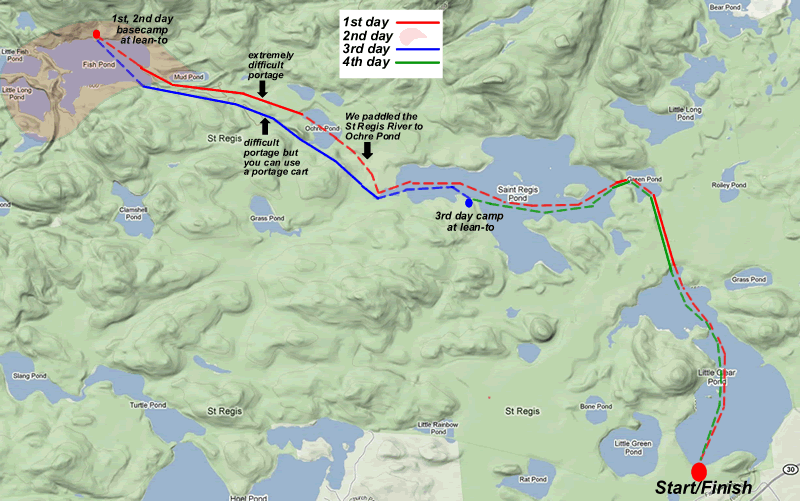
It’s a place in New York that you can only get to by canoe or on foot. A place with pristine lakes and streams, wild sunsets, and mysterious wildlife calling in the night. It’s a place know best by past generations and largely left untouched. It’s not easy to get there; you have to really want to do it.
This is part 1 of a 4 part Adirondack wilderness canoe trip report.
Our First Day
It was a cool misty morning with a strong hint of rain in the air when we started across Little Clear Pond, but I wasn’t concerned about the weather on this trip because over the years I’ve learned how to keep dry even in extreme wet conditions. But the canoe journey across Little Clear Pond is some distance and by the time we reached the portage trail to Green Pond most of the mist and fog had burned off and it was shaping up to be a very nice day. The Green Pond portage was short (about 1 hour) but I thought it was a little challenging because it actually required us to do two portage carries to transport all the gear.
Once completing the portage to Green Pond we wasted no time paddling through Green Pond and make the very short portage to Saint Regis Pond. It was still early in the day as we paddled across the familiar Saint Regis Pond so I had developed a sense of relief that we’d made it to our destination early and the rest of the day would be an easy day spent slowly working our way to our actual base camp location at Fish Pond. I was even thinking that I should have brought along a fishing rod because there would be some time to kill. I had no idea that most of the remaining day would be spent on a single portage trail.
We made the long canoe journey across Saint Regis Pond to the very narrow St. Regis River tributary that would permit us to paddle to Ochre Pond instead of using the portage trail. I was excited about paddling this small creek as it was one of the highlights on our last trip (dashed red line between Ochre and Saint Regis Pond). It takes about thirty minutes to paddle this small creek to Ochre Pond and it’s a lot of fun if you don’t mind a little wear and tear on your canoe (kevlar owners be cautious). If you ever do a St. Regis canoe trip I recommend you paddle this tributary for various reasons.
- Reason #1 it’s one of the few opportunities on this trip to paddle moving water.
- Reason #2 it’s great fun testing your ability to negotiate the creeks sharp turns and natural obstacles.
- Reason #3 it flows through a remote wilderness environment that few people have the privilege to experience.
- Reason #4 it’s just makes more sense to paddle than portage.
But it’s after floating the St. Regis River tributary to Ochre Pond when things really begin to get challenging. You’ll see on the map above the distance from Ochre Pond to Fish Pond is one of the longer portages, and there are two portage trail options you can take, the extremely difficult mountain trail (solid red line) between Ochre and Fish Pond and the longer but flatter fire road (solid blue line) that will take you from Saint Regis Pond or Ochre Pond to Fish Pond. We chose to portage over the mountain trail into Fish Pond.
The many steep grades on this trail never seem to end, you go down one steep slope and up another; your lungs are burning and your shoulder muscles are in pain from the weight of your canoe, and you are taking baby steps because you don’t want to stop and use precious energy to get moving again. About half way through the carry you come arrive at a refreshing stream crossing that looks like a perfect spot to take a break, but if your unlucky you might break an ankle while balancing your canoe overhead and stepping around the rocks in this very slippery stream. Once you’ve made it through the stream you feel slightly refreshed as the cold water on your feet feels good, but then it’s up another steep slope that requires every bit of energy you can muster.Finally you are carrying on level ground but just as you begin to build momentum you encounter a log blocking the trail and you are forced to make the quick decision whether to carry over the log or carry around the log through the woods. Either way you run the risk of losing your balance and dropping your canoe to the ground, which is not something you want to do because everytime you throw that boat back over your shoulders you are using precious energy. Even a 40 lb boat wears you down on this trail.
You ask yourself if you are crazy and how many others have done this because it’s the kind of trail that would be a challenging hike for many people, and here you are carrying a canoe and four days worth of camping gear over it. You promise yourself that you will never step foot onto this trail again. You complete this portage exhausted, bedraggled and in no mood for anything but an easy night at camp. When this portage ends you might say something like, “Thank God, I’ve finally made it to Fish Pond.”
Fish Pond Camping
Late in that afternoon we arrived at Fish Pond. I can’t tell you the relief we all felt because we knew the massively painful portage was over and we could enjoy hanging around camp for a while. And I guarantee that if you like remote wilderness camping then you will love camping at Fish Pond. The remoteness of Fish Pond makes a unique camping experience and depending on how crowded it is you might have the choice of setting up tents or camping in a lean-to shelter.
We shared Fish Pond with a few other paddlers but we still had the entire north side of the pond to ourselves. Two of our paddlers slept in the lean-to where they seemed to be protected from all but the worst weather that might come through. Although there is something luring about sleeping under these shelters, they offered me the
opportunity but the shelters are just big enough to accommodate two adults – three would be a crowd. As far as a campfire goes we were too tired to collect wood and deal with maintaining a fire so we didn’t have one. Headlamps and small lanterns provided us the light we needed. Our first evening was spent eating quick meals and then watching the sun set on the shore of Fish Pond. After dark we gathered around the lean-to and discussed wilderness canoeing until about 9:30 pm then called it a day. We slept well without interruptions. Camping at Fish Pond is everything I thought it would be, remote, primitive and serene.
The Second Day
It was our first morning at Fish Pond, and we started it off with a camping stove malfunction that nearly burned down the lean-to structure (it was still standing when we left, honestly). After we extinguished this near disaster the rest of the day was spent exploring the Fish Pond area by canoe and foot (shown by the red shade on the map). Immediately after our very early breakfast we set out on Fish Pond and paddled to the west end where we portaged into Little Fish Pond. We had two options to get into Little Fish Pond, the easy way over the short portage trail (about 100 ft) and the hard way. Jerry and I naturally opted for the hard way over logs and small beaver dam like structures (it’s called bushwhack or combat style canoeing).
We spent some time paddling Little Fish Pond then we attempted to paddle to Lydia Pond but gave up due to a blocked water trail. We then made the steep portage into Little Long Pond where we ate lunch, and afterwards we walked a portage trail to another small isolated pond (Kit Fox Pond, I think) where we spent some time resting at the waters edge.
We found a shorter portage back to Fish Pond; it was one of the steepest and most technical canoe portages we ever managed but it did cut off about an hour of retracing our trail. If you do a wilderness canoe trip be sure to have detailed canoe route maps of the area because they will lead you to alternative routes and campsites.
Combat (Bushwhack Style) Canoeing
Later that afternoon I attempted a paddle up the St. Regis River tributary for some photos but I didn’t make it too far and decided to turn back after crossing the second beaver dam (I’ve canoed this tributary once before from Ochre Pond down to Fish Pond and do recommend it if you’re in the mood for some bushwhack style canoeing). Although we did do quite a bit of exploring on Fish Pond and the other nearby smaller ponds we never made it to a few of the more isolated ponds in the area. It was a disappointment to be so close to the famously remote Lydia Pond but not having the chance to explore it, but that’s also a good excuse for another trip.
Later that day we occupied time by taking videos and photos, hiking a few of the portage routes, and trying out each other’s canoes on Mud Pond. I saw two canoe campers from another group fishing but I’m not sure if they had any luck.
That second evening was much the same as the first evening with meal preparation, talking, and a quick cold swim in Fish Pond. And that night was uneventful except for when the lean-to campers woke in the middle of the night to attach a tarp to the structure because of a passing rain storm and someone who made a few trips to the privy due to his freeze dried dinner. Again we had no campfire and no campsite visits from bears or other wildlife but we did have a visit from a raccoon.
Go on to part 2 of this Adirondack canoe trip report –>
View a photo gallery of this Adirondack Canoe Camping Trip –>

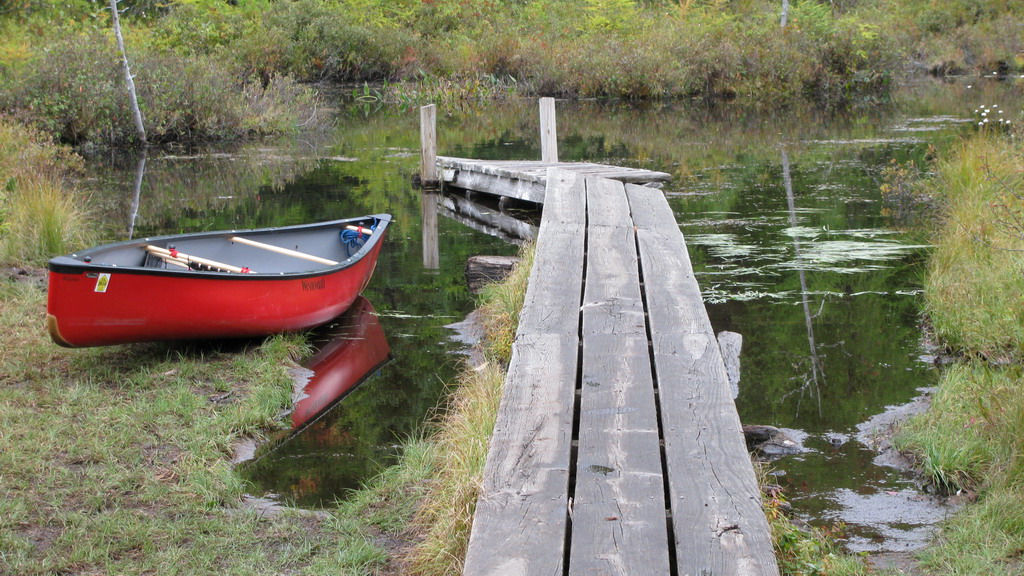
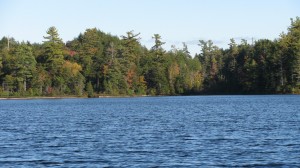
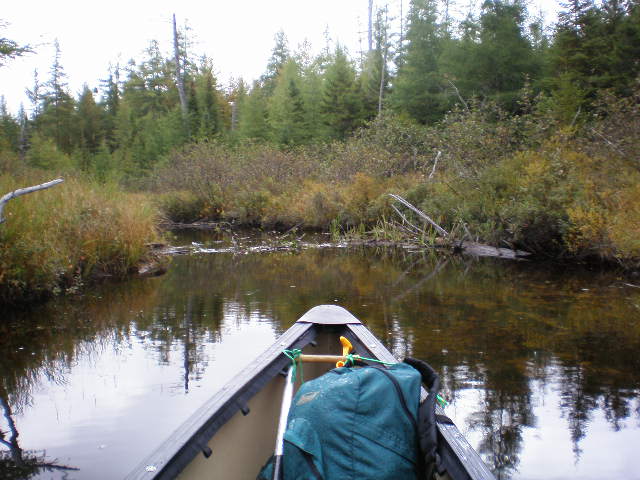
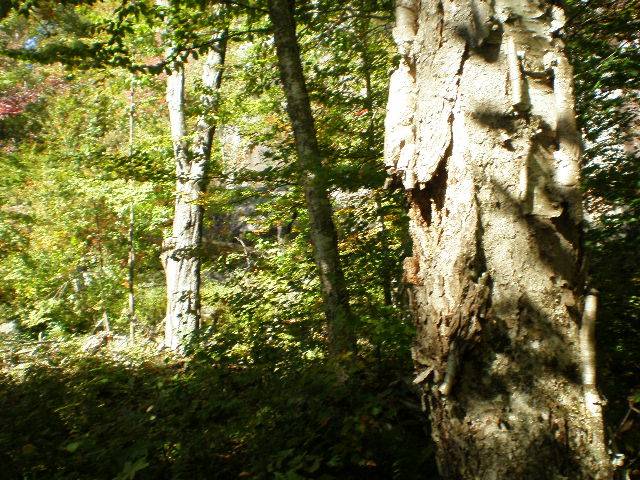
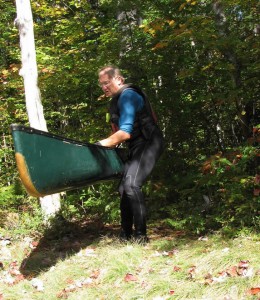
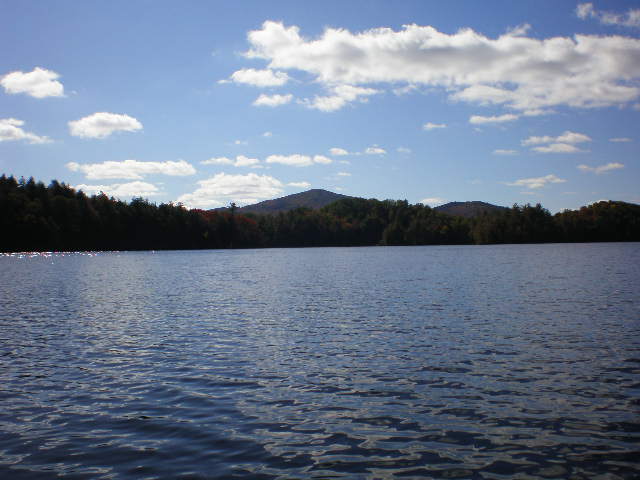
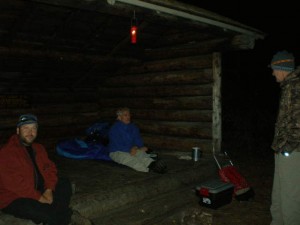
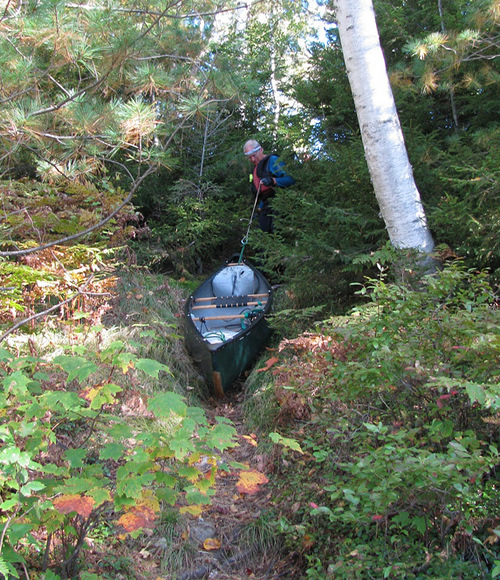
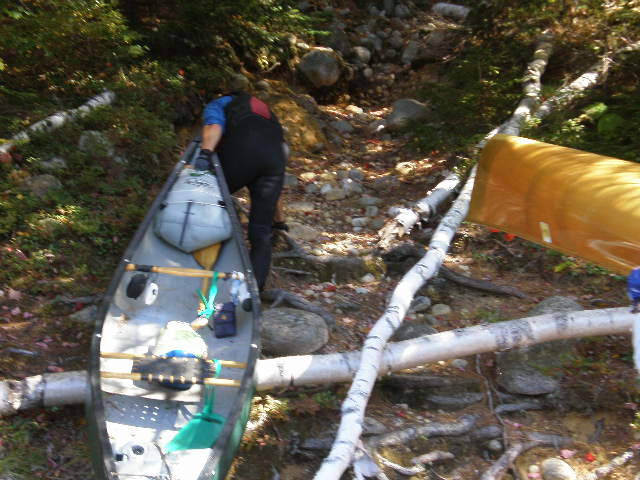
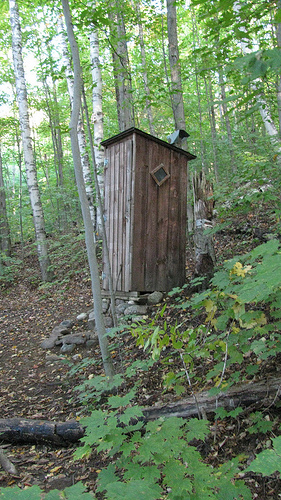
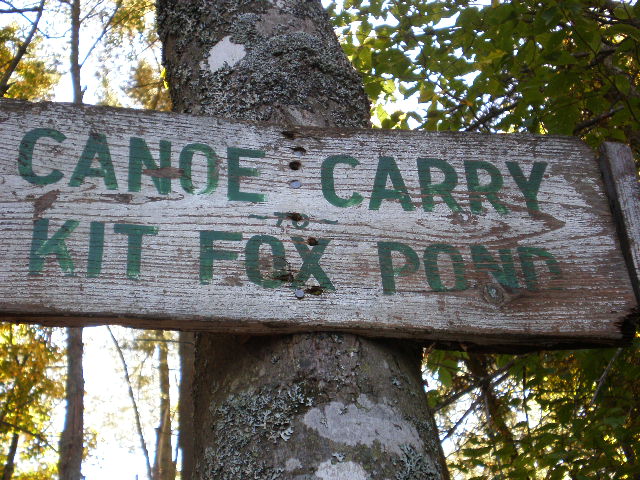
Enjoyed the trip report — thanks so much. I did the Little Tupper Lake/Lake Lila traverse a few weeks ago and headed back up that way next week for five or 6 days. Do you do a lot of paddling in the Adirondacks? Take care and thanks again. Howard
Hello Howard, it’s nice knowing people are appreciating my trip report. So far I’ve done two Adirondack trips and intend to do more in the future. I had plans to go to the BWCA this year but unfortunately other things came up and I had to cancel.
Stick around my blog and maybe we’ll get together on a trip in the future.
Regards,
Darren
Thanks for the trip report and your kind words from my YouTube Video: Saint Regis Solo Canoe Trip http://www.youtube.com/watch?v=MelKv64359s. Another nice area of the Adirondacks is the Whitney C. Whitney area containing Little Tupper Lake, Rock Pond, Lake Lila, and Round Lake (note: google maps is incorrect in showing the boundaries of the Wilderness Area, Round Lake and its outlet are now part of the preserve). I think you would enjoy the area. I find the Adirondack Paddler’s Map and its companion Adirondack Paddler’s Guide by Dave Cilley an excellent resource.
Yours in Paddling,
John